

Think / Challenges of Gifted Adults from Dabrowski's theory of positive disintegration. Alert to Gifted Advocates: We Need to Keep This Meme! Myths About Giftedness. ~ by Mary Rocamora, M.A. ~ There are many myths about the gifted that are held in the mainstream culture.

They permeate conventional parenting and our educational system, including private education. These misconceptions and attitudes drift along in the mainstream mindset unnoticed, except perhaps by gifted people trying to accomplish something meaningful in their lives when they run up against them. The gifted can make it by themselves — they don’t need any extra attention, either as children or as adults. Actually, gifted children and adults need more mirroring and mentoring than most people because there is more inside that is yearning to be lived. Even if you have extraordinary talents, keep your light under a bushel. One should never feel too good about one’s abilities or show them off except when invited or alone. You can be gifted on your own time. After you have done everything you “should” do, you will finally be free to do something meaningful or creative.
Perfectionism: Bane or Blessing? Idealism and Perfectionism in the Gifted. And the gifted child Perfectionism can be observed in even very young gifted children because of the lack of synchrony between their intellectual and physical development.
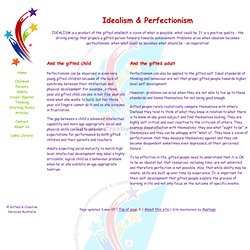
For example, a three year old gifted child can see in her five year old mind what she wants to build, but her three year old fingers cannot do it and so she screams in frustration. The gap between a child's advanced intellectual capability and more age-appropriate social and physical skills can lead to unrealistic expectations for performance by both gifted children and their parents and teachers. Adults expecting social maturity to match high level intellectual development may label a highly articulate, logical child as a behaviour problem when he or she exhibits an age-appropriate tantrum.
And the gifted adult Perfectionism can also be applied to the gifted self. However, problems can arise when they are not able to live up to these standards and blame themselves for not being good enough. Social-emotional needs of the highly gifted. Fiedler, E.
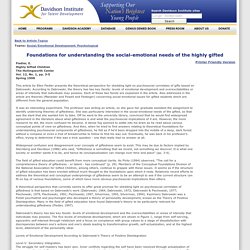
Highly Gifted Children The Hollingworth Center Vol. 12, No. 1, pp. 3-5 Spring 1998 This article by Ellen Fiedler presents the theoretical perspective for shedding light on psychosocial correlates of gifts based on Dabrowski. According to Dabrowski, the theory has two key facets: levels of emotional development and overexcitabilities or areas of intensity that individuals may possess. Each of these two facets are explained in the article. Also addressed in the article are theories (Manaster and Powell and Festinger) concerning social-emotional issues for gifted students which are different from the general population. Existential depression in gifted individuals. Existential Depression in Gifted Individuals by James T.
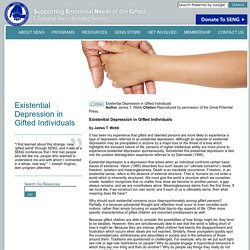
Webb It has been my experience that gifted and talented persons are more likely to experience a type of depression referred to as existential depression. Although an episode of existential depression may be precipitated in anyone by a major loss or the threat of a loss which highlights the transient nature of life, persons of higher intellectual ability are more prone to experience existential depression spontaneously. Sometimes this existential depression is tied into the positive disintegration experience referred to by Dabrowski (1996).
Existential depression is a depression that arises when an individual confronts certain basic issues of existence. Why should such existential concerns occur disproportionately among gifted persons? Gifted Adults and Existential Depression. The “me” behind the mask: Intellectually gifted students and the search for identity. The “Me” Behind the Mask: Intellectually Gifted Students and the Search for Identity The process of identity development in intellectually gifted children and adolescents is complicated by their innate and acquired differences from age-peers.
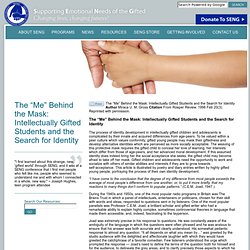
To be valued within a peer culture which values conformity, gifted young people may mask their giftedness and develop alternative identities which are perceived as more socially acceptable. The weaving of this protective mask requires the gifted child to conceal her love of learning, her interests which differ from those of age-peers, and her advanced moral development. If this assumed identity does indeed bring her the social acceptance she seeks, the gifted child may become afraid to take off her mask.
Gifted children and adolescents need the opportunity to work and socialize with others of similar abilities and interests if they are to grow towards self-acceptance. Joad was extremely precise in his response to questions. The Too Many Aptitudes Problem. The Too Many Aptitudes Problem (Condensed from Danger: High Voltage) Hank Pfeffer[Out of date contact information omitted.]
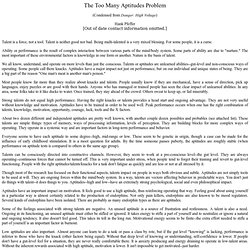
Talent is a force, not a tool. Talent is neither good nor bad. Being multi-talented is a very mixed blessing. Ability or performance is the result of complex interaction between various parts of the mind/body system. We all know, understand, and operate on more levels than just the conscious. Most people know far more than they realize about knacks and talents. Strong talents do not equal high performance. About two dozen different and independent aptitudes are pretty well known, with another couple dozen possibles and probables (see attached list). Everyone seems to have each aptitude to some degree--high, mid-range or low. Talents can be consciously directed into constructive channels. Though most of the research has focused on their functional aspects, talents impact on people in ways both obvious and subtle.